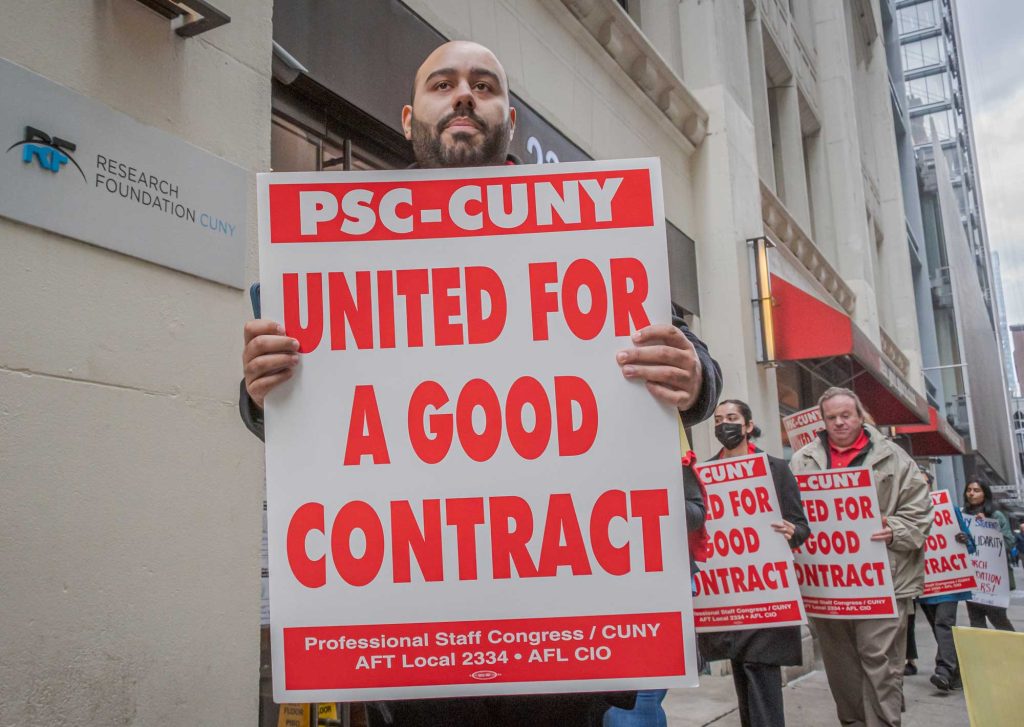
Research Foundation members march for a contract. (Credit: Erik McGregor)
PSC members at the Research Foundation of CUNY’s Central Office (RF Central) are turning up the pressure as management continues to resist their contract demands in the current round of negotiations.
A PSC pamphlet read, “Management at the CUNY Research Foundation is offering a low-ball average annual raise of 3.25% to Central Office workers after we’ve worked through COVID and almost two years of near-record inflation. Our raises have gotten smaller and smaller. We’re paying almost twice what we used to pay for health insurance, and we aren’t going to take it anymore.”
BARGAINING DEMANDS
The workers are demanding 4 and 5% raises. Members said they are also demanding contractual language to enshrine the office’s current policy of a 50% remote work schedule, which management refuses to include. Management also refuses to accept language mandating “reasonable workloads,” members said.
The Research Foundation is a private, nonprofit organization that is technically separate from CUNY, but the chancellor and several CUNY campus presidents sit on its governing board. PSC members at RF Central are not governed by the state’s Taylor Law and thus can legally conduct a strike. Bargaining for RF Central is a separate process from bargaining for the main PSC-CUNY contract.
Evan Michelin, a senior desktop specialist at RF Central, said management’s economic proposal is not acceptable given the current rate of inflation.
“I feel like we’re in a recession right now,” he told Clarion. “I don’t understand why 4% is so hard.”
Michelin said management’s current economic offer is insulting, largely because the RF’s 990 filings show that its chief executives earn annual salaries above $200,000. “For them, they don’t feel a staggering recession,” he said.
Laurence Furman, a project administrator, agreed.
“It’s not enough,” he said of the RF’s economic offer, adding that the union’s demand was necessary because “with the rising cost [of living], which is not going to get better, we need this.”
The members at RF Central also demand that the next contract include language enshrining the workers’ current schedule, which is 50% in-office and 50% remote. “Why can’t they put it in the contract? Why can’t they put it in writing?” Furman asked.
Maintaining some kind of remote work structure for non-faculty members is a major priority for the PSC in its bargaining for PSC-CUNY and RF contracts. This hybrid work is not just for COVID safety but because remote and flexible work schedules have been vital in improving members’ work lives and productivity.
REMOTE WORK
Michelin said that he believed a 50/50 remote work schedule was important because even though the pandemic has calmed down, another catastrophe could happen in the future. Workers should be ready to continue their work even if conditions bar them from coming into the office safely. “The pandemic is not going to [be] the last crisis we have,” he said. “The 50/50 [split] is something that’s important for everybody.”
For RF Central members, management’s low-ball negotiation has been unacceptable because the workers need more money to keep pace with rising costs, and they want to improve their working conditions. There is also a fundamental issue of respect. Members said they worked extra hard during the pandemic to keep the RF Central office afloat, but management won’t recognize that.
“It’s a kind of ‘We don’t really need you’ feeling,” Michelin said. “I do feel disrespected.
Published: April 26, 2023

